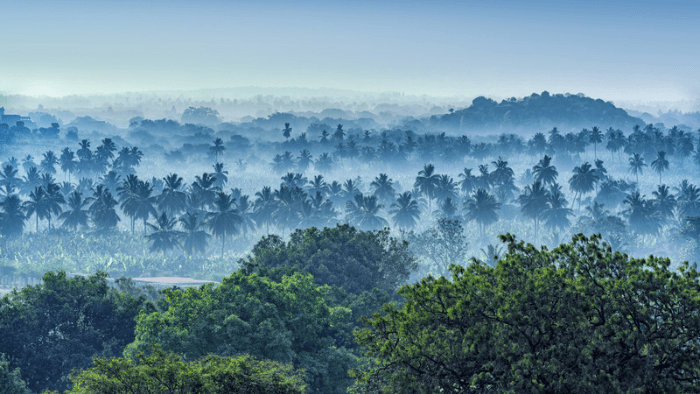shipping text / shipping price
Your shopping bag is empty
Go to the shop

Karnataka: Land of Abundance, Coffee, and Heritage
Karnataka, located in the Western Ghats of India, is a land of abundance with a rich cultural heritage. The region is known for its diverse agricultural practices, with farmers cultivating a wide range of crops such as spices, fruits, and vegetables. These crops contribute to the unique profile of the coffee, with the flavors and aromas of the surrounding vegetation seeping into the beans.
Coffee has been cultivated in Karnataka for centuries, with the first coffee plantations established as far back as 1670 by Baba Budan. The story is an important part of the history of coffee in India. Baba Budan was a 16th-century Sufi saint who is credited with introducing coffee to India.
According to legend, Baba Budan went on a pilgrimage to Mecca and discovered coffee during his travels. He was so taken with the drink that he decided to bring it back to his homeland of India.
When Baba returned to India, he smuggled seven coffee beans out of Mecca by strapping them to his chest. He then traveled to the hills of Chikmagalur in Karnataka, where he planted the seven beans.
The coffee plants thrived in the Western Ghats, with the unique microclimate of the region providing the perfect environment for their growth. Soon, coffee plantations sprang up across the region, with Karnataka becoming the largest producer of coffee in India.
The story of Baba Budan has become a part of Indian folklore, and he is considered a hero in the coffee world. Today, there is even a peak in the Western Ghats named after him, called the Baba Budan Giri Range.
But the legacy of Baba Budan goes beyond the introduction of coffee to India. He was also a social reformer who advocated for the rights of the poor and marginalized. He is revered by both Hindus and Muslims, and his tomb in the town of Chikmagalur is a popular pilgrimage site.
In addition to his social and religious contributions, Baba Budan's introduction of coffee to India has had a profound impact on the country's economy and culture. Coffee is now an integral part of the Indian diet and is enjoyed by people from all walks of life.
The story of Baba Budan is a testament to the power of one person's vision and determination. His legacy lives on in the coffee plantations of Karnataka and in the hearts of the people of India.
Today, the state is the largest producer of coffee in India, with over 70% of the country's coffee being grown here. The Western Ghats, a UNESCO World Heritage Site, creates a perfect environment for coffee, with the altitude, rainfall, and temperature all contributing to the plant's growth and flavor.
Regenerative farming practices have become increasingly popular among coffee farmers in Karnataka. These practices focus on improving soil health and biodiversity, reducing chemical inputs, and creating a more sustainable and resilient farming system. The aim is to create a holistic approach to farming that benefits the environment, the farmer, and the consumer.
One example of regenerative farming in Karnataka is the use of shade trees. Coffee plants naturally grow in the shade, and in traditional coffee farms, shade trees are used to protect the coffee plants from direct sunlight. But shade trees also provide habitat for birds and other wildlife, which in turn help control pests and diseases. In addition, the fallen leaves of the shade trees act as a natural fertilizer, reducing the need for chemical inputs.
Another regenerative farming practice in Karnataka is intercropping. This involves growing multiple crops together in the same field, which helps improve soil health and biodiversity. Farmers in Karnataka have been intercropping coffee with a range of crops, including spices like pepper and cardamom, as well as fruits like banana and orange.
At House of Word Coffee, we are very happy to be a part of this story which is why we source our beans from the best coffee farms in Karnataka. The company is committed to sustainability and works closely with farmers to promote regenerative farming practices. Grown in the shade of pepper plants, banana and orange, the unique combination of crops gives our coffee its distinctive flavor of, rich chocolate and caramel.
But Karnataka is not just about coffee. The Western Ghats is considered one of the world's eight "hottest hotspots" of biological diversity, and is home to several national parks and wildlife sanctuaries, including Bandipur National Park, Nagarhole National Park, and Bhadra Wildlife Sanctuary. The region is home to over 7,400 species of flowering plants, 139 mammal species, 508 bird species, and 179 amphibian species. It is a nature lover's paradise, with opportunities for trekking, birdwatching, and wildlife photography.
In conclusion, Karnataka's unique microclimate, diverse crops, and commitment to sustainability make it a perfect environment for coffee production. The state's rich cultural heritage and natural beauty make it a must-visit destination for travelers. From the coffee plantations to the national parks, Karnataka offers a glimpse into the beauty and bounty of India's Western Ghats.




